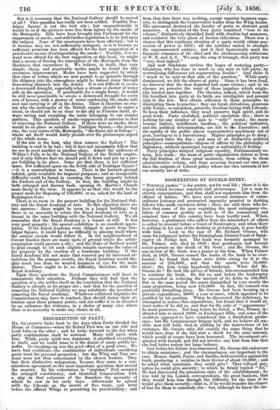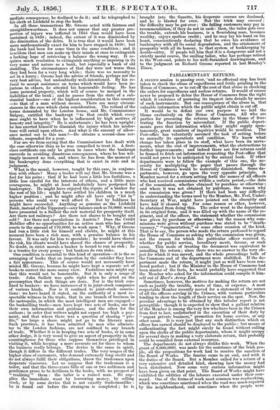• BOOKKEEPING BY DOUBLE-ENTRY.
"POETICAL justice" is for poetry, not for real life ; there it is the unjust which becomes romantic and picturesque. Let a man be strictly conscientious and that shall not exonerate him from the offence of failure. 'We have seen several instances of extra- ordinary leniency and protracted impunity granted to dashing fellows who made enormous debts • there are still those who be- lieve that some of the men expiating the most outrageous vio- lation of common probity as well as of the commercial and. criminal laws of this country have been hardly used. When, however, a gentleman who suffers from the misconduct of others is called to account before a Court of Bankruptcy, and when there is nothing in his case of the dashing or picturesque, it goes hardly with him. Look to the ease of Mr. Richard Greene, who came for judgment before the Birmingham District Court of Bank- ruptcy on Friday last. The bank was formerly managed by Mr. Palmer, who died in 1850 • that gentleman had become senior partner on the death of M;. Scott • and Mr. Greene the son-in-law of Mr. Scott, was a junior in the firm. When Palmer died, in 1850, Greene caused the books of the bank to be over- hauled : he found that there were debts owing by it to the amount of 239,0001., and that the assets were 70,0001. short ; the firm being hopelessly bankrupt. What did Mr. Greene do ? He took the advice of friends, who recommended hini to continue the bank. He did so, and before the bankruptcy he succeeded in reducing the amount of -its debts to 188,0001. But in the same period the assets diminished in very nearly the same proportion being now 118,000/. In fact, the concern was gradually dwindling away. Mr. Greene had been keeping up a private expenditure, 30001. a year or more' which appeared to be justified by his position. When he discovered the deficiency, he attempted to reduce this expenditure, but found that it would at- tract notice if he did so, and that for the sake of " appearances " he must persevere. Not long before he failed, a Mrs. Hussey in- structed him to invest 1000/. in Exchequer Bills, and some of the creditors a •ared to have considered this a fraudulent prefer- ence; but w . Commissioner Balguy held, and we believe all sen- sible men will hold, that in abiding by the instructions of his customer, Mr. Greene only did exactly the same thing that he would have done if she had sent a check for the same amount, which would of course have been honoured. The investment ori- ginated with herself, and did not involve any hint from him that she had better reduce her large balance. Just before his failure was announced, Mr. Greene did endeavour to obtain assistance ; and the circumstances are important to the case. Messrs. Smith, Payne, and Smiths, held securities against his bank, producing a surplus in their favour of about 18,0001.; and he asked what assistance they could give? They refused any, unless he could give security to which he firmly replied "No." He had discovered the precarious state of the establishment; he was told by his London correspondents, the great bankers, that they would help him through the difficulty for the time if he would give them security—that is, if he would transfer the chance of loss for them to somebody else : but, although he knew the im-
mediate consequence, he declined to do it; and he telegraphed to his clerk at Lichfield to step the bank.
In all these transactions Mr. Greene acted with fairness and straightforwardness. It does not appear that any greater pro- portion of injury was inflicted in 1855 than would have been sustained in 1850; indeed, the extent of it was diminished by the diminution of the debts. It is true that it would have been more mathematically exact for him to have stopped in 1850; but the bank had been for some time in the same condition ; and it is seldom that men can make up their minds at once to extinguish a lurking hope of retrieving a balance the wrong way: It re- quires much resolution to extinguish anything so imposing in its very name and nature as a bank, but especially a bank of old standing. The circumstances of that day were not worse than they. had been for a very long while ; there was no necessity to act in a hurry ; Greene had the advice of friends, perhaps not the very best advice, but undoubtedly well-intentioned. By his re- fusal to accept assistance on terms which would have been in- jurious to others, he attested his honourable feeling. Ile has some personal property, which will of course be merged in the liabilities of the bank ; and he passes from the state of a sub- stantial banker—one of the highest consideration in this country —to that of a man without means. There are many circum- stances in the ease which claim consideration. The refusal of the terms demanded by the London house said Mr. Commissioner Balguy, entitled the bankrupt "to that credit which every man ought to have when he is influenced by high motives of honesty and integrity." He is unfortunate ; he has been upright; he has exerted himself to diminish the injury which his misfor- tune will entail upon others. And what is the amount of allow- ance meted out to this man ?—He obtains a second-class cer- tificate, suspended for a year.
Far are we from saying that the Commissioner has dealt with the case otherwise than as he was compelled to treat it. A first- class certificate can only be given in cases where the bankrupt succeeds in avoiding disastrous consequences, where he has wit- tingly incurred no risk, and where he has from the moment of his bankruptcy done everything that is exact in rule and in judgment.
What is the moral, however, taught by this case' in conjunc- tion with others ? Many a trader will say that Mr. Greene was a fool for his pains ; that if he had been a little less fastidious, a little less careful for the interests of others' and a little more courageous, he might at least indefinitely have postponed his bankruptcy. He might have enjoyed the repute of a banker for the rest of his life ; might have settled his children in a much higher position • and he might after all have only "let in" persons who could very well afford it. But by boldness he might have succeeded. Anything so genuine as the Lichfield Bank, instead of the Tipperary—any balance such as 70,000/. would have presented to a Sadleir the raw material for prosperity itself. Are there not railways ? Are there not shares to be bought and sold ? Are there not speculations in Austria? Does the Credit Mobilier offer no opportunities for an active man who has actual assets to the amount of 170,000/. to. work upon ? Why, if Greene had ran a little risk for himself and clients, he might at this moment have been a rich man, with a genuine balance in his favour. It was only for him to speculate ; he would have shared the risk, his clients would have shared the chance of prosperity. No doubt, in strict morals a banker is bound to run no risk ; he is a trustee for every penny : but bankers do run risks. One condition is essential to this kind of operation—it is the so arranging of books that on inspection by the outsider they have a fair appearance. This of course would not necessarily have misled Mr. Greene, because he might have kept a separate set of books to correct the more sunny view. Fastidious men might say that this would not be honourable. But it is only a usage of
trade. John Sadleir was quite right when he acted on the presumption that such things are done. Nor is the trick con- fined to bankers : we have instances of it in joint-stook companies of various kinds. Nor is it confined to joint-stock associa- tions: we have heard it stated, on the authority of a most re- spectable witness in the trade, that in one branch of business in the metropolis, in which the most intelligent men are engaged— the bookselling trade—men have kept two sets of books, one for their own information and guidance, and the other for the authors ; in order that writers might not expect too high a pay- ment, and that where there was a question of sharing "pro- fits," too large a share might not go to the literary man. Such practices, it has been admitted by men who adminis- ter to the London fashions, are not confined to any branch of trade. Whether it is in keeping two sets of books, or in some other dodge, it is very usual to give an aspect of prosperity in the countinghouse for those who suplarse themselves privileged in visiting it, while keeping a more accurate set for those to whom the business really belongs. The device is the same in spirit, though it differs in the different trades. The very usages of the higher class of customers, who demand extremely long credit and do not always fulfil their obligations, throw the tradesmen upon desperate resources. Let us suppose that the tradesman is a tailor, and that the three-years bills of one or two noblemen and
gentlemen prove to be fictitious in the books, with no prospect of "realizing" them : the tailor is a ruined man. He sup-
plies the immediate want by borrowing money, by selling stock, or by some device that is not exactly tradesmanlike : he is found out before the stratagem is completed ; he is
brought into the Gazette, his desperate courses are disclosed-, and he is blasted for ever. But the trick may succeed ; the difficulty may be got over ; the failing customers may pay in recommendation, if they do not in cash : then, the tailor gets over the trouble, extends his business, is a flourishing man becomeswealthy, enjoys spotless credit; and he may lay his hand on his heart, conscientiously declaring that he owes his avoidance of bankruptcy with all its social degradation, and the attainment of prosperity with all its honour' to that system of bookkeeping by double-entry. If people tell him that it is a dangerous and not a strictly moral course! the smiling tailor, who has perhaps retired to the 'West-end, points to his well-furnished drawmgroom, and to the judgment on Richard Greene reported in last Monday's Times.



































 Previous page
Previous page